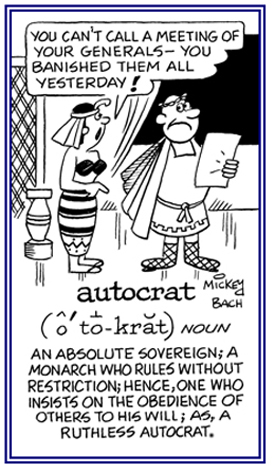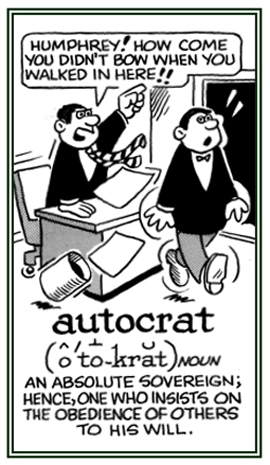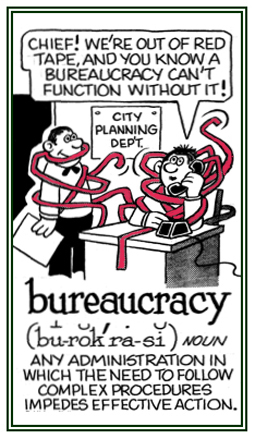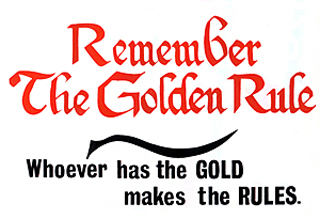-crat, -cracy, -cratic, -cratism, -cratically, -cracies
(Greek: a suffix; to govern, to rule; government, strength, power, might, authority)
Good laws derive from evil habits.
Two characteristics of government are that it cannot do anything quickly, and that it never knows when to quit.
2. A person who is invested with or assumes unlimited authority with any relationship: Adam's daughter, Susan, called him an unreasonable autocrat.
The state! It is I!


Go to this Word A Day Revisited Index
so you can see more of Mickey Bach's cartoons.
2. The management or administration which is marked by hierarchical authority among numerous offices and by fixed procedures: Some government offices are accused of being a rigid bureaucracy and thus impeding or slowing down actions because of their overly strict adherence to rules or regulations.
To satisfy the government bureaucracy, James and Jane had to fill out several different forms and then they had to wait for some weeks before they obtained the payment that they had coming to them.
3. An administrative system in which the need or inclination to follow rigid or complex procedures interferes with efficient and effective actions: Innovative or new ideas too often get bogged down in red tape in a bureaucracy.Too often bureaucracies insist on going through rigid routines, resulting in delays in making decisions or in carrying out requests. This is also known as "red tape" which comes from the former use of red or pink tape to tie up or to seal official documents for security reasons.
Too often a bureaucracy is where more is said than is actually done.
Red tape is what binds bureaucracy together and it represents projects that are often never completed until the weight of the paper work is equal to the weight of all the workers who are involved.

Go to this Word A Day Revisited Index
so you can see more of Mickey Bach's cartoons.
Bureaucratic rule can be exemplified by “desks” or government officials who "govern the desks".
The actual work of government is too unglamorous for the people who govern us to do. Important elected officeholders and high appointed officials create bureaucratic departments to perform the humdrum tasks of national supervision.
Government proposes, bureaucracy disposes; and the bureaucracy must dispose of government proposals by dumping them on us.
A public administration in many countries are examples of bureaucratisms, but so is the centralized hierarchical structure of a business firm.
In the United States military establishment, bureaucratisms involve the civil service with government workers and officials who are usually hired on the basis of competitive examinations.
2. Etymology: from Greek kainos = ceno, "new, recent" + Greek demokratia, "popular government" from demos, "common people".
Some people maintain that China has always been a chirocracy, and if this is true, there are also many other countries that fit this description.
Examples of additional nations that practice cheirocracy include North Korea, some Arabic countries, and even former President Trump of the U.S.A. who restricted immigrants coming in from Mexico with military forces.



